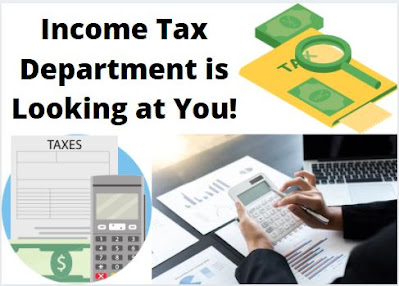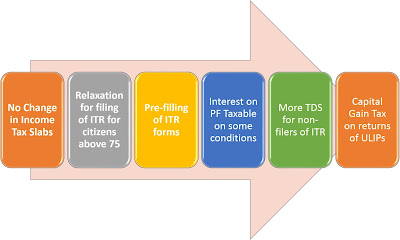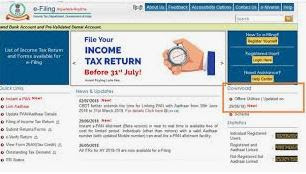Compliance of 206AB for DDOs
-Dr. Lalit Kumar Setia
In
the Union Budget 2021, a new rule was introduced to deduct Tax Deduction at
Source (TDS) at higher rates on cases with certain nature of income and from
the persons who have not filed Income Tax Return (ITR) in the last two years
and total amount TDS exceeds Rs. 50,000 in each year. How to know, whether the
person whose TDS is being deducted is the person with requirement to deduct TDS
rates at higher rate or not? What will be the rate of TDS if it is required to
deduct at higher rate? How to ensure compliance of Section 206AB which is
having this rule?
How much TDS be deducted if person
lies in certain category to deduct TDS on Higher Rate?
As
per provisions, the TDS will be either “twice the rate of TDS normally deducted
as specified in a particular relevant section” or 5% whichever is higher. It
means the TDS rate will be at least 5% for such persons and higher than 5% if
twice rate of TDS is more than 5%.
How to know that the person whose TDS
to be deducted, has not filed ITR during last two years and total TDS amount
exceeds Rs. 50,000 in each year?
The
Deductors (DDOs in Government) required to ensure compliance of 206AB &
206CCA which states to deduct TDS at higher rates for certain category of
persons. How to know whether the person whose TDS is being deducted falls in
such category or not.
The
Income Tax Department web-portal has a functionality to check such persons by
inserting their PAN number or PAN Numbers in bulk. The deductors (if required)
can feed PAN number of the person and get the response from the web-portal,
download the response in .pdf file, and thereafter keep the same or show the
same to the person and deduct TDS at higher rates. For the Financial year
2021-22, from 1st July 2021, it is enforced to implement section
206AB and 206CCA.
The
persons who did not file Income Tax Returns (ITRs) of FY 2018-19 and FY 2019-20
and have aggregate of TDS amount Rs. 50,000 or more in each of the previous
years; will be listed in that functionality. The Income Tax Department will
list such persons every year and according to the list, the Deductors will have
to deduct TDS at higher rate for such persons whose name is listed in the
functionality.
As
per notification no. 1 of 2021-Income Tax dated 22.06.2021:
Compliance Check Functionality for
Section 206AB & 206CCA of Income-tax Act 1961
Section 206AB and 206CCA inserted in the Income-tax Act,1961
(effective from 1st July 2021), imposed higher TDS/TCS rate on the “Specified
Persons’ defined as under,
“For the purposes of this section ‘
specified person” means a person who has not
filed the retums of income for both of the two assessment years relevant to the
two previous years immediately prior to the previous year in which tax is
required to be collected, for which the time limit of filing retum of income under sub-section (1) of section 139 has expired; and the
aggregate of tax deducted at source and tax collected at source in his case is
rupees fifty thousand or more in each of these two previous years.
Provided that the specified person shall
not include a non-resident who does not have a permanent establishment in India.
Explanation.-For the purposes of this sub-section,
the expression ‘permanent establishment” includes a fixed
place of business through which the business of the enterprise is wholly or
partly carried on.”
2. To facilitate Tax Deductors and Collectors in
identification of Specified Persons as defined in sections 206AB and 206CCA,
the Central Board of Direct Taxes (“CBDT”), in exercise of powers conferred
under section 138(1 )(a)(i) of Income-tax Act, 1961 (Act), has issued Order via F.No. 225/67/2021/ITA.II
dated 21.06.2021 , directing that Director General of
Income-tax (Systems), New Delhi shall be the specified income-tax authority for
furnishing information to the “Tax Deductor/Tax Collector”, having registered
in the reporting portal of the Project Insight through valid TAN, to identify
the ‘Specified Persons’ for the purposes of section 206AB and 206CCA of the Act
through the functionality “Compliance Check for Section 206AB& 206CCA”.
3. Income Tax Department has released a new functionality
·Compliance Check for Section 206AB & 206CCA to facilitate tax
deductors/collectors to verify if a person is a “Specified Person” as per
section 206AB & 206CCA. This functionality is made available through
(https://report.insight.gov.in) of Income-tax Department. Kindly refer to CBDT Circular No. 11 of 2021 dated
21.06.2021 regarding use of functionality under section
206AB and 206CCA of the Income-tax Act, 1961 .
4. The following procedure is laid down for sharing of
information with tax deductors/collectors:
a) Registration: Tax Deductors and Collectors
can register on the Reporting Portal by logging in to e-filing portal
(http://www.incometax.gov.in/) using e-filing login credential of TAN and
clicking on the link “Reporting Portal” which is available under “Pending
Actions” Tab of the e-filing Portal. After being redirected to the Reporting
Portal, the tax deductor/collector needs to select Compliance Check (Tax
Deductor & Collector) under Form Type. The details of the principal officer
also need to be provided by clicking on “Add Principal Officer” button. The
principal officer is the authorized person of the tax deductor/collector to use
the Compliance Check functionality on reporting portal. After submission of
registration request, email notification will be shared with the Principal
Officer along with ITDREIN details and login credentials.
b) Accessing the Compliance Check functionality:
Principal
Officers of the entities (Tax Deductors & Collectors) which are registered
with the Reporting Portal through TAN shall be able to use the functionality
after login into the Reporting Portal using their credentials. After
successfully logging in, link to the functionality “Compliance Check for
Section 206AB & 206CCA” will appear on the home page of the Reporting
Portal.
c) Using “PAN Search” mode:
Under
the “Compliance Check for Section 206AB & 206CCA” page, “PAN Search” tab
may be selected to access the functionality in PAN Search mode. In this mode
single valid PAN along with captcha can be entered at a time and output will be
available with following fields,
o
Financial Year: Current Financial Year
o
PAN: As provided in the input.
o
Name: Masked name of the Person
(as per PAN).
o
PAN Allotment date: Date
of allotment of PAN.
o
PAN-Aadhaar Link Status: Status
of PAN-Aadhaar linking for individual PAN holders as on date. The response
options are Linked (PAN and Aadhaar are linked), Not Linked (PAN & Aadhaar
are not linked), Exempt (PAN is exempted from PAN-Aadhaar linking requirements
as per Department of Revenue Notification No. 37/2017 dated 11th May 2017) or
Not-Applicable (PAN belongs to non-individual person).
o
Specified Person u/s 206AB & 206CCA: The
response options are Yes (PAN is
a specified person as per section 206AB/206CCA as on date) or No (PAN is not a
specified person as per section 206AB/206CCA as on date).
Output will also provide the date on which the
“Specified Person” status as per section 206AB and 206CCA is determined.
d) Using “Bulk Search” mode:
Under
the “Compliance Check for Section 206AB & 206CCA” functionality page, “Bulk
Search” tab may be access to access the functionality in Bulk Search mode. This
mode involves following steps:
i. Preparing request (Input) file containing PANs: Under
the “Bulk Search” page, CSV Template to enter PANs details may be downloaded by
clicking on “Download CSV template” button. PANs for which “Specified Person”
status is required may be entered in the downloaded CSV template. The current
limit in the number of PANs in a single file is 10,000.
ii. Uploading the input CSV file: Input
CSV file may be uploaded by clicking on Upload CSV button. Uploaded file will
start reflecting with Uploaded status.
iii. Downloading the output CSV file: After
processing, CSV file containing “Specified Person” status as per section 20SAB
& 206CCA of the entered PANs will be available for download and “Status’
will change to Available. Output CSV file will contain PAN, Masked Name,
Specified Person Status as per section 20SAS & 206CCA, PAN-Aadhar Link
status and other details as mentioned in paragraph c) above. After downloading
of the file, the status will change to Downloaded. The download link will
expire and status will change to Expired after specified time (presently 24
hours of availability of the file).
5. For any further assistance, Tax Deductors &
Collectors can refer to Quick Reference Guide on Compliance Check for Section
206AS & 206CCA and Frequently Asked Questions (FAQ) available under
“Resources’ section of Reporting Portal. They can also navigate to the “Help”
section of Reporting Portal for submitting query or to get a call back from
Customer Care Team of Income-tax Department. Customer Care Team of Income-tax
Department can also be reached by calling on its Toll Free number 1800 1034215
for any assistance.
6. This issues with the approval of CBDT. (Sanjeev Singh), ADG(Systems)-2 CBDT.
On which categories of income,
Section 206AB is not applicable?
The
Drawing and Disbursing Officers (DDOs) in Government organizations and
employers in Private Sector Organizations; generally deduct TDS on Salaries of
the employees u/s 192 of Income Tax Act. The new section 206AB is not
applicable on such TDS deduction. Further, it is also not applicable on TDS
deducted on withdrawl from Provident Funds u/s 192A, Winnings from Lotteries /
races on which TDS is deducted u/s 194B & 194BB, Payment of certain amount
on which TDS is deducted u/s 194N, and Income in respect of investment in
securitisation trust on which TDS is deducted u/s 194LBC.
Section
206AB and Section 206CCA will be applicable on the persons whose time limit for
filing ITR under section 139(1) has expired and the person has not filed ITR
during last 2 previous years and also whose aggregate TDS in each of these previous
years is Rs. 50,000 or more.
Are you interested in an Online Course related to Income Tax?:
1. https://smartinstituterls.blogspot.com/2022/12/income-tax-matters-in-government.html
2. https://smartinstituterls.blogspot.com/2022/12/computation-of-income-tax-liability.html
Previous Article
Next Article































